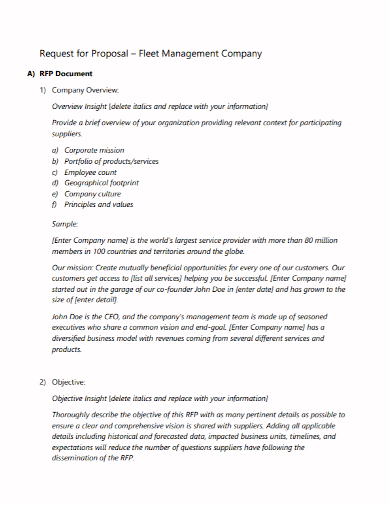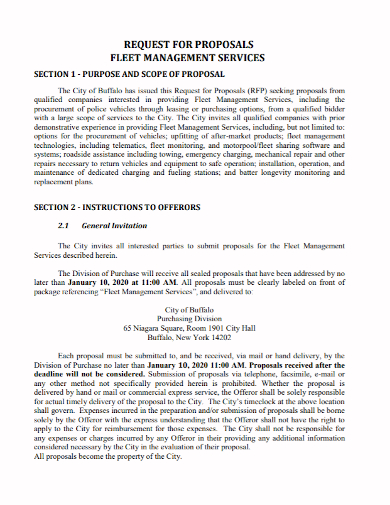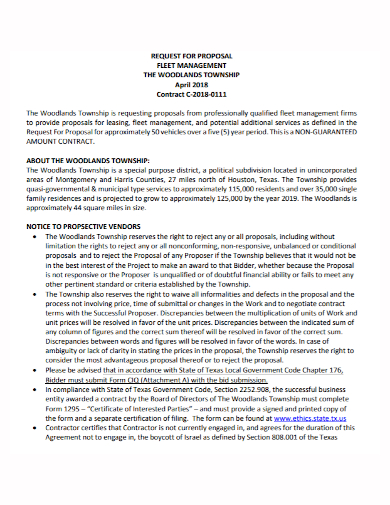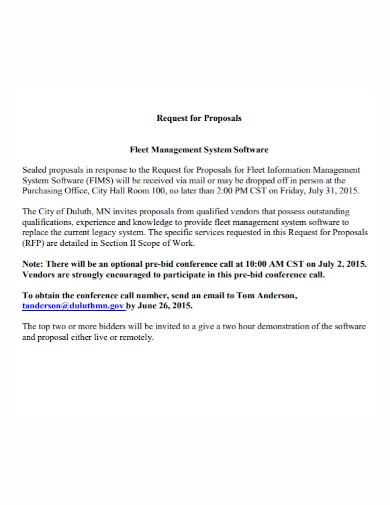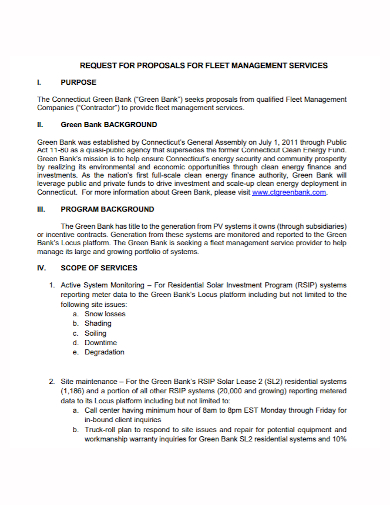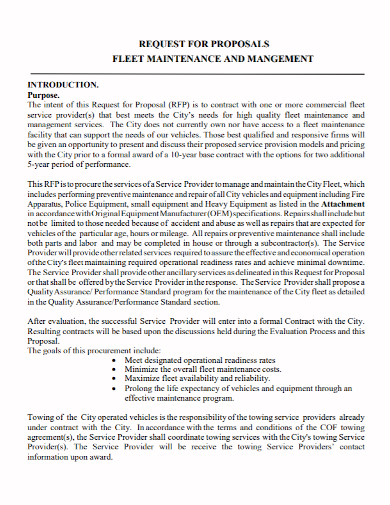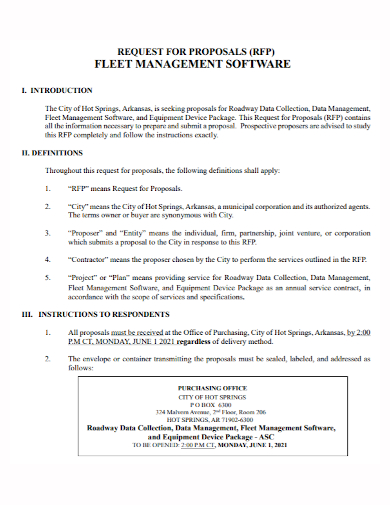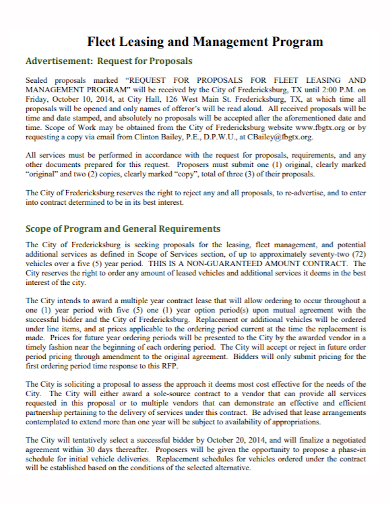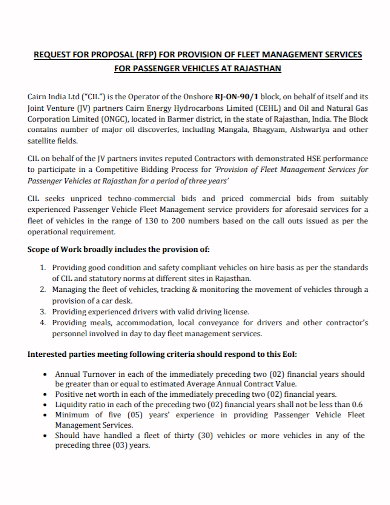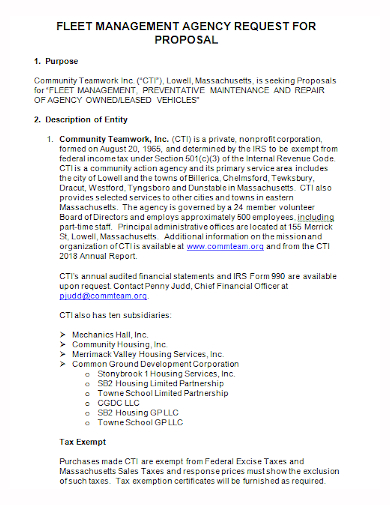Fleet operations and fleet management are used by any organization that requires commercial vehicles to function. The goal of fleet management is to keep track of all fleet performance and maintenance to boost productivity and keep a company running smoothly. Fleet managers are in charge of fleet operations, which may include vehicle maintenance, fuel consumption and costs, driver management, asset utilization, route planning, and the implementation of any programs that improve company productivity and reduce waste. Vehicle telematics and fleet management software are frequently used by fleet management companies to improve fleet efficiency and lower operational costs.
10+ Fleet Management Proposal Samples
From acquisition to disposal, fleet management is the process by which your company manages all fleet and asset information. This allows your company to cut costs, increase efficiency, and ensure compliance across the entire fleet. We understand that managing a fleet of commercial vehicles is difficult at the best of times. When you add in external factors like legislation, car market uncertainty, and cost spiraling that a fleet manager faces but has little control over, the task can quickly become overwhelming. The appropriate software, in our opinion, can play a significant role in coordinating your fleet management activities.
1. Fleet Management Proposal Template
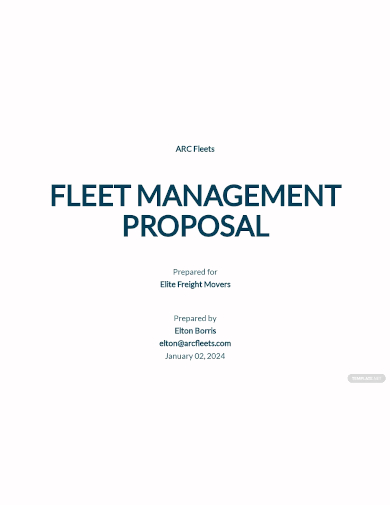
2. Fleet Management Company Proposal
3. Fleet Management Services Proposal
4. Fleet Management Proposal
5. Fleet Management System Proposal
6. Fleet Management Request for Proposal
7. Fleet Management Maintenance Proposal
8. Fleet Management Software Proposal
9. Fleet Management Program Proposal
10. Vehicle Fleet Management Proposal
11. Fleet Management Agency Proposal
Role of a Fleet Manager
- Driver safety – Keeping drivers safe is a major challenge for fleet companies and fleet managers alike. It can be difficult to ensure safe driver behavior when fleet managers are hundreds of miles away from the moving vehicle. There are tools that fleet managers can use to bring real-time visibility into an otherwise remote vehicle as well as provide evidence or materials to enforce driver training, such as dash cams or vehicle tracking systems.
- Driver retention – In the trucking industry, driver shortages are becoming more of a problem. The goal for fleet managers should always be to stabilize and increase driver retention. Fleet managers look to different approaches to ensure drivers are happy at work, such as creating mentorship programs, enhancing workplace conditions, or simply establishing strong trust between driver and manager.
- Fleet tracking – To ensure driver safety, fleet managers must be able to pinpoint the exact location of each vehicle at any given time. Although it may appear to be a simple task, tracking the location of a fleet of 5 or 5,000 vehicles can be difficult. To know where their vehicles are and gain visibility into their fleet operations and vehicle safety, fleet managers frequently rely on GPS technology and other GPS tracking systems.
- Electronic Logging Device (ELD) compliance – The ELD mandate is a congressional mandate that requires commercial vehicle operators to electronically record Hours of Service (HOS) starting in December 2017. The mandate aims to eliminate paper logging and reduce dangerous driving caused by tired drivers. For fleets that are required to comply with the mandate, fleet managers must implement ELD-compliant systems to ensure that drive time is accurately recorded.
- Total cost reduction – Fleet managers are expected to identify and eliminate any unnecessary expenses to help create more cost-friendly and efficient fleet operations, whether it’s fuel management or lowering operating costs. The costs of operations, fuel, and maintenance can quickly add up. The fleet manager’s job is to find cost-cutting solutions and help a company increase productivity, whether it’s implementing fuel efficiency programs (no matter how high or low fuel prices are) or asset tracking.
- Vehicle acquisition – A fleet manager must forecast how many and what types of vehicles a fleet will require to operate efficiently to effectively manage it. It may appear simple to purchase new vehicles when the need arises, but understanding and forecasting fleet vehicle utilization is critical in determining the best purchase strategy. Employee vehicle class eligibility, vehicle lifecycle, and even market timing are all important factors in a successful vehicle acquisition strategy.
FAQs
What is the purpose of fleet management?
If your company uses vehicles for commercial purposes, you’ll need to hire a fleet management company. The operation’s goal will be to manage the entire lifecycle of commercial vehicles while lowering risk, improving efficiency, increasing productivity, and ensuring legal compliance. The grey fleet, which consists of employee vehicles used for work purposes, should be included in this process as well.
What is the benefit of a fleet management?
Managing a fleet of vehicles, regardless of their size, can be difficult. According to data from Government Fleet’s annual benchmarking survey, over 75% of fleet managers rely on fleet management software or vehicle telematics to help support day-to-day operations in at least some of their vehicles. Through predictive analytics and accurate reporting, fleet management software can help fleet managers gain real-time visibility into their transactions while increasing driver satisfaction and lowering fuel consumption.
There are a lot of companies that have fleets. Understanding the processes that go into running a fleet will help your company keep costs under control, stay competitive in the market, and meet customer expectations. Fleet management can be handled in-house by appointing a fleet manager, or it can be outsourced to an external fleet solutions provider.
Related Posts
Small Business Proposal Samples
Title Project Proposal Samples [ Community, School, Student ]
FREE 10+ Product Supply Proposal Samples in MS Word | Google Docs | Apple Pages | PDF
FREE 10+ Health Project Proposal Samples [ Public, Mental, Healthcare ]
FREE 11+ Engineering Project Proposal Samples in PDF | MS Word
FREE 4+ Racing Sponsorship Proposal Samples [ Team, Car, Driver ]
FREE 10+ Nursing Project Proposal Samples [ Community, Health, Clinical ]
FREE 11+ Student Council Proposal Samples in PDF | DOC
FREE 10+ Facilities Management Proposal Samples in MS Word | Google Docs | Apple Pages | PDF
FREE 8+ Joint Venture Proposal Samples [ Commercial, Real Estate, Construction ]
FREE 10+ Scholarship Proposal Samples [ Project, Grant, Sponsorship ]
FREE 10+ Computer Purchase Proposal Samples in MS Word | Google Docs | Apple Pages | PDF
FREE 10+ Network Project Proposal Samples [ Design, Security, Bank ]
FREE 14+ Accounting Proposal Samples in PDF | MS Word
FREE 10+ Church Event Proposal Samples in MS Word | Google Docs | Apple Pages | PDF

